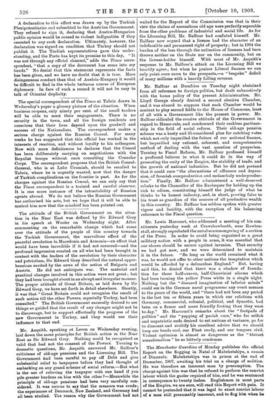Mr. Asquith, - speaking at •Leven on Wednesday evening, laid down
the same principles for British action in the Near East as Sir Edward Grey. Nothing could be recognised as valid that had not the consent of the Poweri. Turning to domestic questions, Mr. Asquith answered Mr. Balfour's criticisms of old-age pensions and the Licensing Bill. The Government Iliad been careful to pay off Debt and give substantial relief to taxpayers before they had thought of embarking on any grand scheme of social reform.—But what is the use of relieving the taxpayer with one hand if you pile greater burdens on him with the other P—Meanwhile the principle of old-age pensions had been very carefully con- sidered. It was untrue to say that the measure was crude; the experiences of Denmark, New Zealand, and Germany bad all been studied. The reason why the- Government had not waited for the Report of the Commission was that in their view the claims of necessitous old age were perfectly separable from the other problems of industrial and social life. As for the Licensing Bill, Mr. Balfour had confuted himself. Mr. Balfour now argued that a license had the character of an indefeasible and permanent right of property ; but in 1904 the burden of the loss through the extinction of licenses had been thrown neither on the State nor on the community, but on the license-holder himself. With most of Mr.. Asquith's response to Mr. Balfour's attack on the Licensing Bill we heartily agree ; but when he praises Liberal finance we can only point once more to the prospects,—a " bespoke" deficit of many millions with a heavily falling revenue.














































 Previous page
Previous page